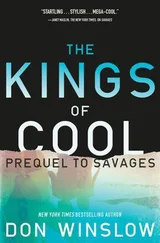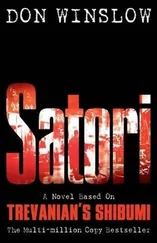1 ...8 9 10 12 13 14 ...43 “I knew that would be your answer,” Caro says. He lowers his voice so Eddie can barely hear him say—
“Find us a mayate. ”
A black guy.
“From New York. With an early release date. Put him in your debt,” Caro says. “Do you understand?”
Jesus Christ, Eddie thinks. Caro is still a player.
He does the math—Caro has done twenty years on his twenty-five-year sentence. Federal time, they can make you do every day or they can knock it down to 85 percent, maybe even less.
Which makes Caro a short-timer, looking at the gate.
And he wants back in the game.
“I understand, Señor,” Eddie says. “You want to put the arm on a black guy who’s going to get out soon. But why?”
“Because Adán Barrera was right,” Caro says.
Heroin was our past.
And our past is our future.
He don’t need to tell Eddie that .
Keller gets on the horn to Ben O’Brien. “Call me back on a clean line.”
The first time Keller met O’Brien was in a hotel room in Georgetown a few weeks before the Guatemala raid. They didn’t exchange names, and Keller, who was never much of a political animal, didn’t recognize him as a senator from Texas. He just knew that the man represented certain oil interests willing to fund an operation to eliminate the Zeta leadership because the “Z Company” was taking over valuable oil and gas fields in northern Mexico.
The White House had just officially rejected the operation but sent O’Brien to authorize it off the record. The senator arranged a funding line through his oil connections and helped put together a team of mercenaries through a private firm based in Virginia. Keller had resigned from DEA and joined Tidewater Security as a consultant.
Now O’Brien calls him back. “What’s wrong?”
Keller tells him about Eddie’s threat. “You have any leverage at BOP? Get Ruiz’s PSI scrubbed?”
“In English?”
“I need you to reach out to someone in the Bureau of Prisons and get Ruiz’s records cleansed of any trace of his deal,” Keller says.
“We’re letting drug dealers blackmail us now?” O’Brien asks.
“Pretty much,” Keller says. “Unless you want to answer a lot of questions about what happened down in Guatemala.”
“I’ll get it done.”
“I don’t like it any more than you do.”
Goddamn Barrera, Keller thinks when he clicks off.
Adán vive .
Elena Sánchez Barrera is reluctant to admit, even to herself, that her brother is dead.
The family held out hope through the long silence that lasted days, then weeks, and now months, as they tried to glean information as to what had happened in Dos Erres.
But so far they’ve come up with no new information. Nor, apparently, have the authorities disseminated what they do know down the ranks—it seems as if half of law enforcement believe that the rumor of Adán’s death was put out as a smoke screen to help him evade arrest.
As if, Elena thinks. The federal police are virtually a wholly owned subsidiary of the Sinaloa cartel. The government favors us because we pay them well, we retain order and we’re not savages. So the idea that Adán staged his own death to avoid capture is as ludicrous as it is widespread.
If it wasn’t the police, it was the media.
Elena had heard the term media circus before, but she never fully realized what it meant until the rumors about Adán’s death began to swirl. Then she was besieged—reporters even had the nerve to set up post outside her house in Tijuana. She couldn’t go out the door without being harassed by questions about Adán.
“How many ways can I say ‘I don’t know’?” she had said to the reporters. “All I can tell you is that I love my brother and pray for his safety.”
“So you can confirm he’s missing?”
“I love my brother and pray for his safety.”
“Is it true your brother was the world’s biggest drug trafficker?”
“My brother is a businessman. I love him and pray for his safety.”
Every fresh rumor prompted a new assault. “We’ve heard Adán is in Costa Rica.” “Is it true he’s hiding in the United States?” “Adán has been seen in Brazil, Colombia, Paraguay, Paris …”
“All I can tell you is that I love my brother and pray for his safety.”
The pack of hyenas would have eaten little Eva alive, torn her to shreds. If they could have found her. It wasn’t for lack of trying. The media flooded Culiacán, Badiraguato. An ambitious reporter in California even tracked down Eva’s condo in La Jolla. When they couldn’t find her, they pestered Elena.
“Where is Eva? Where are the boys? There are rumors they’ve been kidnapped. Are they alive?”
“Señora Barrera is in seclusion,” Elena said. “We ask you to respect her privacy in this difficult time.”
“You’re public figures.”
“We’re not,” Elena said. “We’re private businesspeople.”
It was true—she had retired from the pista secreta eight years ago, when she agreed to turn over the Baja plaza to Adán so he could give it to the Esparzas. She had done so willingly—she was tired of the killings, of the death, that went along with the trade and was happy to live off her many investments.
And Eva knows as much about the drug trade as she does about particle physics. Goodhearted, beautiful, and stupid. But fecund. She served her purpose. Gave Adán sons and heirs. The twin boys—Miguel and Raúl. And what will become of them? Elena wonders.
Eva is a young Mexican woman, a young Sinaloan woman. With her father and husband apparently dead, she probably feels that she has to obey her older brother, and Elena wonders what Iván has been telling her.
I know what I would tell her, Elena thinks. You’re an American citizen and so are the boys. You have enough money to live like a queen the rest of your life. Take your sons and run back to California. Raise your children away from this business, before you and they are trapped in it for another generation. It will take some time, but eventually the media circus will pack up and move to the next town.
Hopefully.
The bizarre social alchemy of this vulgar age has turned Adán into that most precious of public commodities—a celebrity. Images of him—old mug shots, random photos taken at social events—are plastered over television screens, computer monitors, front pages of newspapers. The details of his 2004 escape from prison are recited with titillated delight. “Experts” join panels of talking heads to assert Adán’s power, wealth and influence. Mexican “witnesses” are interviewed to testify about Adán’s philanthropy—the clinics he built, the schools, the playgrounds. (“To you he is a drug trafficker. To us he is a hero.”)
Celebrity culture, Elena thinks.
An oxymoron.
Even if you could control the traditional press, corralling social media is like grabbing mercury—it slips out of your hand and breaks into a thousand more pieces. The internet, Twitter, Facebook are electric with “news” about Adán Barrera—every rumor, whisper, innuendo and bit of misinformation went viral. Behind the screen of digital anonymity, people inside the organization who know they shouldn’t be talking are leaking what information they have, mixing little bits of truth into a stew of falsehood.
And the most pernicious rumor of all—
Adán is alive.
It wasn’t Adán at all in Guatemala, but a double. The Lord of the Skies outsmarted his enemies yet again.
Adán is in a coma, hidden away in a hospital in Dubai.
I saw Adán in Durango.
In Los Mochis, in Costa Rica, in Mazatlán.
Читать дальше












